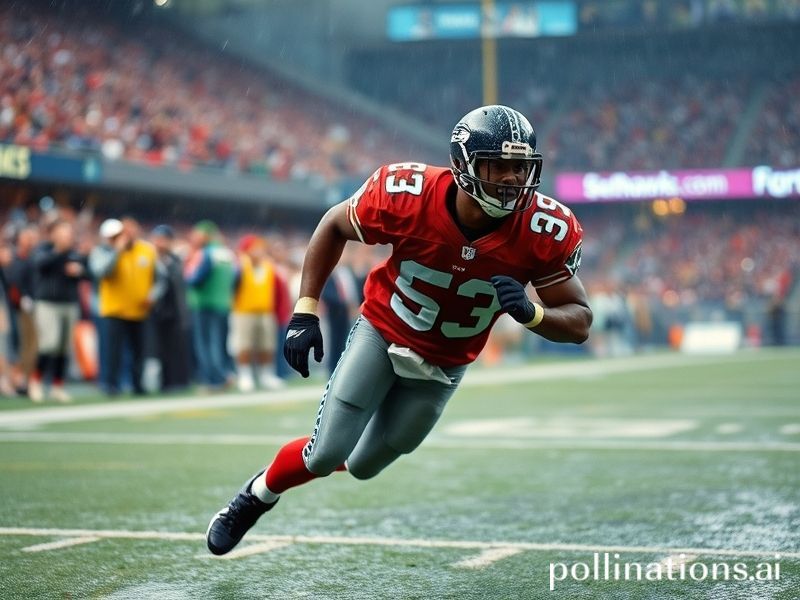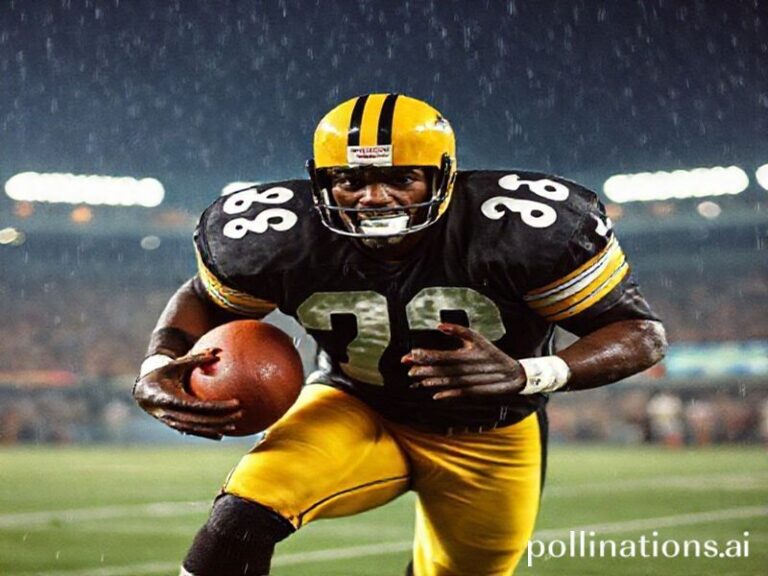From Seattle to Singapore: How Shaun Alexander Became the World’s Most Misunderstood Sports Metaphor
In the annals of American football, few names conjure the same polite, transatlantic shrug as Shaun Alexander. To the average Parisian café philosopher or Singaporean derivatives trader, the phrase sounds less like a gridiron legend and more like the alias on a mildly suspicious offshore wire transfer. Yet Alexander’s 2005 MVP season—when he carried the Seattle Seahawks to a Super Bowl they would politely hand to the Pittsburgh Steelers—offers a perfect microcosm of the early-2000s global order: record-setting productivity, corporate sponsorships that aged like milk left on a Lagos tarmac, and a denouement that reminded everyone the house always wins.
Let us zoom out, like a bored drone operator on a Tuesday shift. In 2005, the planet was busy: the Kyoto Protocol wheezed into force, Angela Merkel became Germany’s first female chancellor, and YouTube was born so teenagers from Montevideo to Mumbai could watch grainy clips of people falling off treadmills. Into this brave new bandwidth stepped Alexander, a running back so effortlessly wholesome that Disney considered cloning him for theme-park greeters. He scored 28 touchdowns that season, a stat that thrilled American fantasy-league bros and left the rest of the world wondering why anyone needed more than one ball per game.
Internationally, Alexander’s significance was mostly symbolic—a living, 225-pound metaphor for peak unipolar hubris. America, flush with post-9/11 adrenaline and subprime mortgage brochures, exported its culture the same way Alexander exported defenders into the end zone: violently, stylishly, and under the impression the highlight reel would never end. Corporations slapped his face on cereal boxes from Cincinnati to Kuwait City, where U.S. military PX aisles offered Cinnamon Toast Crunch as a soft-power bribe. The Seahawks even played the first regular-season NFL game outside the U.S. that year, in Mexico City, because nothing says “global outreach” like rich men in pads colliding on a repurposed Aztec pitch.
Then came the inevitable. Alexander signed an eight-year, $62 million contract, an amount roughly equivalent to Iceland’s annual herring budget. Within three seasons, injuries turned him into a cautionary tale—an accelerated version of what would happen to the entire Western financial model two short years later. The Seahawks cut him in 2008, the same year Lehman Brothers collapsed, proving once again that gravity is the only truly international law.
What can the world learn from Shaun Alexander? First, that transcendent talent is no hedge against systemic risk—whether you’re a running back or the Greek treasury. Second, that global brands will canonize you right up until the moment the marketing algorithm senses declining Q-scores in Jakarta focus groups. And finally, that every empire—athletic, economic, or geopolitical—eventually discovers salary-cap hell.
Today, Alexander pops up on NFL Network retrospectives and the occasional Nigerian Twitter thread debating the greatest one-season wonders. He’s embraced philanthropy with the same quiet diligence he once reserved for finding cut-back lanes, funding literacy programs in Alabama and Rwanda alike. Somewhere in Kigali, a child sounding out syllables thanks to Alexander’s foundation will never know that the man financing her books once stiff-armed a Buffalo Bill into another dimension. That, too, is globalization: cause and effect so distantly linked they might as well be on separate continents—which, come to think of it, they are.
In the end, Alexander’s legacy is less about touchdowns than about the fleeting nature of dominance itself. Nations rise, currencies fall, running backs get tackled by time. The only constant is the broadcast—now streaming in 4K from Reykjavík to Riyadh—reminding us that every highlight reel ends with the same word: replay. And yet we keep hitting the button, because hope, like a screen pass, is designed to look open until it absolutely isn’t.







